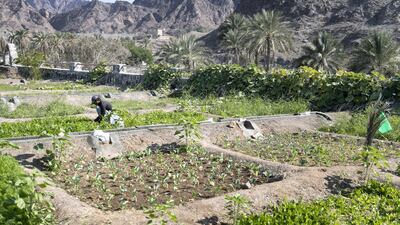After seven years of drought, fresh groundwater has begun to flow to farms in Al Ghail, giving farmers hope that they can revive their crops.
Many had given up on their farms, leaving them to dry out after being unable to keep up with mounting costs from desalinating water to grow produce.
The discovery by farmers this week of fresh groundwater in Ras Al Khaimah, announced by the Environmental Protection and Development Authority, was a welcome surprise for many who once relied on farming as their main source of income.
"I was really surprised and could not believe my eyes. Seeing the freshwater filling the well is like a dream came true," said Abdullah Al Mazroui, an Emirati, 42, who owns a farm in Al Ghail – a village predominantly populated by Al Mazroui tribe.
“My father left me this farm when he died, and to be able to grow vegetables again after many years of drought is something I didn't expect to happen."
Mr Al Mazroui said that last month Wadi Al Faraa, a nearby valley, flooded for the first time in years because of heavy rain. A week later, fresh water began to fill the wells again.
He has two farms, one which had been completely dried out and the other that only grows palm trees and barley grass.
“We used to grow many kinds of vegetables and fruits, but after the wells went dry, we did not have many options, so we stopped growing them and only used underground saltwater to grow palm trees and barley grass,” he said.
______________
Read more:
Popularity of locally grown produce surges in UAE
High costs force Fujairah farmers to give up growing fruit and vegetables
Explained: 10 ways to cut your water consumption
______________
He said saltwater can be found 300 meters underground, but not all the farmers have the tools necessary to dig so deep to retrieve it.
“I do not have deep wells in my other farm, only in the current one, and because of that all the crops and trees dried out,” he said.
Mr Al Mazrouisaid he cannot afford to buy fresh or desalinated water to irrigate his crops.
“Seven years ago, I used to sell fresh greens, vegetables and fruits in the market and benefit from it, but after the water became dry, I stopped doing that.
“But now we are starting to grow them again, but in few quantities and only to supply the family and friends because we don’t know if the fresh water will run out again,” he said.
It is believed that the newly discovered groundwater will last up to 6 months, but can provide up to two years of use if it rains more frequently in the area.
The Emirates is among the world's 10 most-arid states and about 15 per cent of the world's desalinated water is consumed here.
In March, the UAE's Energy Minister Suhail Al Mazrouei said water shortages were a "huge concern" for the country and set out plans to initiate water-saving programmes across government buildings, schools and hospitals.
Many aquifers and wells have been depleted through overuse, and while the UAE is building more water desalination plants on the eastern coast, the process is costly and is detrimental to the environment in the long-term.
Another farmer in Al Ghail said he too would revive his plot now that fresh water was available again.
“Water is a blessing and our land needs it to bring life to our trees and crops especially freshwater,” said Rashid Al Mazroui, 36.
“I grow mainly palm trees at my farm because they do not require freshwater or huge amounts of water, and some vegetables once in a while if we manage to collect enough rainwater during winter.”
The Emirati said he hoped the water would flow to their tanks “for ever”.
Mohammed Al Mazroui, 60, said it is not the first time they have had to deal with drought.
“The lack of rain has affected the groundwater levels during the past and we do not have deep wells to get saltwater, so my brothers decided to stop farming and all the palm trees have dried because of that,” he said.
“Farming is part of our culture and our ancestors’ profession, but it is not in our hands and we cannot control it.”

